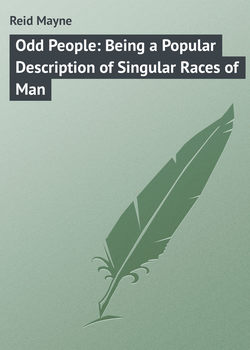Odd People: Being a Popular Description of Singular Races of Man

Реклама. ООО «ЛитРес», ИНН: 7719571260.
Оглавление
Reid Mayne. Odd People: Being a Popular Description of Singular Races of Man
Chapter One. Bosjesmen, or Bushmen
Chapter Two. The Amazonian Indians
Chapter Three. The Water-Dwellers of Maracaibo
Chapter Four. The Esquimaux
Chapter Five. Mundrucus, or Beheaders
Chapter Six. The Centaurs of the “Gran Chaco.”
Chapter Seven. The Feegees, or Man-Eaters
Chapter Eight. The Tongans, or Friendly Islanders
Chapter Nine. The Turcomans
Chapter Ten. The Ottomacs, or Dirt-Eaters
Chapter Eleven. The Comanches, or Prairie Indians
Chapter Twelve. The Pehuenches, or Pampas Indians
Chapter Thirteen. The Yamparicos, or Root-Diggers
Chapter Fourteen. The Guaraons, or Palm-Dwellers
Chapter Fifteen. The Laplanders
Chapter Sixteen. The Andamaners, or Mud-Bedaubers
Chapter Seventeen. The Patagonian Giants
Chapter Eighteen. The Fuegian Dwarfs
Отрывок из книги
In glancing at the map of the American continent, we are struck by a remarkable analogy between the geographical features of its two great divisions – the North and the South, – an analogy amounting almost to a symmetrical parallelism.
Each has its “mighty” mountains – the Cordilleras of the Andes in the south, and the Cordilleras of the Sierra Madre (Rocky Mountains) in the north – with all the varieties of volcano and eternal snow. Each has its secondary chain: in the north, the Nevadas of California and Oregon; in the south, the Sierras of Caraccas and the group of Guiana; and, if you wish to render the parallelism complete, descend to a lower elevation, and set the Alleghanies of the United States against the mountains of Brazil – both alike detached from all the others.
.....
Inside the arrangements are curious. There is a wide hall or avenue in the middle – that extends from end to end throughout the whole length of the parallelogram – and on both sides of the hall is a row of partitions, separated from each other by split palms or canes, closely placed. Each of these sections is the abode of a family, and the place of deposit for the hammocks, clay pots, calabash-cups, dishes, baskets, weapons, and ornaments, which are the private property of each. The hall is used for the larger cooking utensils – such as the great clay ovens and pans for baking the cassava, and boiling the caxire or chicha. This is also a neutral ground, where the children play, and where the dancing is done on the occasion of grand “balls” and other ceremonial festivals.
The common doorway is in the gable end, and is six feet wide by ten in height. It remains open during the day, but is closed at night by a mat of palm fibre suspended from the top. There is another and smaller doorway at the semicircular end; but this is for the private use of the chief, who appropriates the whole section of the semicircle to himself and his family.
.....